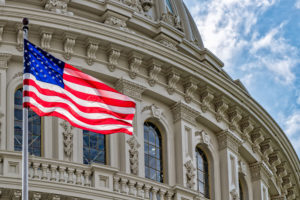
Judge rules Mulvaney is rightful CFPB director, judge clarifies order that military allow transgender people, and more…
IN THE NEWS
- A federal court allowed Mick Mulvaney to continue serving as acting director of the Consumer Financial Protection Bureau (CFPB). President Donald Trump appointed Mulvaney to serve as the acting director of the CFPB after Richard Cordray stepped down as CFPB director last week. However, Cordray named Leandra English acting director before he left the agency. Both Mulvaney and English were claiming to be the agency’s director before the court’s ruling.
- Judge Colleen Kollar-Kotelly of the U.S. Court of Appeals for the D.C. Circuit, clarified the court’s October 30 order stopping the Trump Administration from reversing an Obama-era decision allowing transgender people to serve openly in the military. In the clarification order, Judge Kollar-Kotelly explained that the intention of the October 30 order was to return to the “status quo” of allowing transgender people to serve in the military beginning January 1, 2018.
- After the U.S. Senate Budget Committee approved the Tax Cuts and Jobs Act, the entire U.S. Senate began to deliberate the bill. Budget Committee Chairman Mike Enzi (R-Wyo.) said, “This bill will provide a needed makeover for our out-of-date tax code while advancing American energy security.” But Senator Bernie Sanders (I-Vt.), who sits as Ranking Member on the Committee, derided the bill as “a moral abomination that would take away from so many people in need to give more to people who already have it all.”
- Richard Glick was sworn in as a commissioner of the Federal Energy Regulatory Commission (FERC), following the U.S. Senate’s confirmation on November 2. Glick’s appointment leaves one vacancy remaining in the five commissioner positions at FERC. Another candidate, Kevin J. McIntyre—whom the Senate confirmed on the same day as Glick—reportedly remains to be sworn in as FERC’s chairman.
- AT&T and Time Warner extended the termination date for their merger to April 22, 2018, in light of the U.S. Department of Justice’s lawsuit attempting to block the merger. AT&T said it “intends to vigorously contest the Justice Department’s allegations and is confident that the Court will reject the Justice Department’s challenge to the merger.”
- The City of London issued a proposal to ban fast food restaurants within 400 meters of schools. The proposal also directed communities to evaluate the need for an “overconcentration” of fast food restaurants. The City explained the need for its proposals because there is evidence that fast food is “appealing to children,” and regular consumption of fast food has been shown to lead to weight gain.
- The federal government petitioned the U.S. Supreme Court to uphold a National Marine Fisheries Services (NMFS) 2012 decision to list the Pacific bearded seal as a threatened species under the Endangered Species Act. This petition follows an appeal by the Alaska Oil and Gas Association and American Petroleum Institute of the U.S. Court of Appeals for the Ninth Circuit’s 2016 decision that the NMFS reasonably relied on climate change predictions in labeling this population a threatened species.
- The U.S. Army Corps of Engineers issued a report in accordance with Executive Order 13,783, which tasked agencies with reviewing their existing regulations to identify and subsequently suspend, rescind, or revise “existing regulations that potentially burden the development or use of domestically produced energy resources.” The report recommended potential changes to nine nationwide permits associated with domestic energy productions.
- The Bureau of Safety and Environmental Enforcement (BSEE) will allow an American subsidiary of Italian oil company Eni S.p.A. to conduct “exploratory drilling” in the Arctic. BSEE said that local agency officials will make sure the drilling complies with safety and environmental regulations. Scott Angelle, director of BSEE, said of the plan, “Responsible resource development in the Artic is a critical component to achieving American energy dominance.” Center for Biological Diversity attorney Kristen Monsell asserted, “The Trump Administration ignored the law in rushing to approve dangerous drilling in this remote, beautiful area.”
WHAT WE’RE READING THIS WEEK
- In the Foreword for the just-issued administrative law symposium for the George Washington University Law Review, Cary Coglianese of the University of Pennsylvania Law School argued that the Chevron framework, which requires courts to defer to reasonable agency interpretations of ambiguous statutes, is more than just a two-step test, despite the conventional claims. If a reviewing court finds a statute is unclear, Coglianese suggested it must consider “Interstitial Steps” before moving to consider whether the agency’s interpretation is reasonable. Coglianese explained that these Steps create a framework in which courts defer to agencies’ interpretations “only when Congress has explicitly or implicitly delegated interpretative authority to the agency.”
- In a research paper for the University of Pennsylvania Law School’s Institute for Law and Economics that is forthcoming in the Iowa Law Review, Tom Baker of Penn Law and Benedict G.C. Dellaert of the Netherlands’s Erasmus University Rotterdam discussed “robo advisor” regulations. Baker and Dellaert noted that robo advisors, which are “automated financial product advisors,” can increase consumers’ access to certain “financial services,” such as making investments. Baker and Dellaert warned, however, that, because people create robo advisors, robo advisors may be subject to peoples’ errors or lack of integrity. In response, Baker and Dellaert provided ways that regulators can address the variety of issues that robo advisors raise.
- In an article, Temitayo Bello, lecturer at Nigeria’s Babcock University School of Law and Security Studies, examined the problems ailing the oil and gas industry in Nigeria including “obsolete laws and regulation,…corruption and lack of government funding.” Bello suggested an approach that is “holistic” and “surgical” in nature to help the industry resolve its issues.



